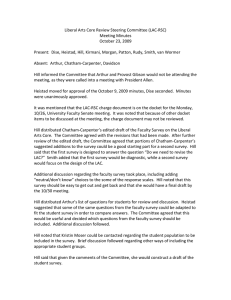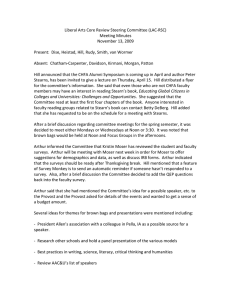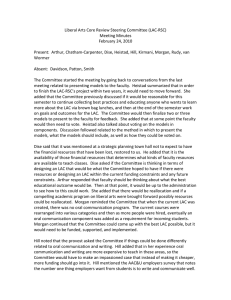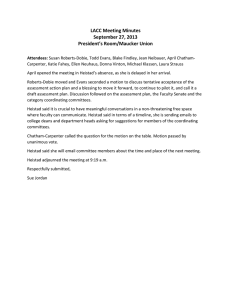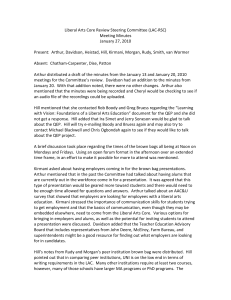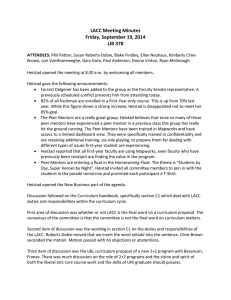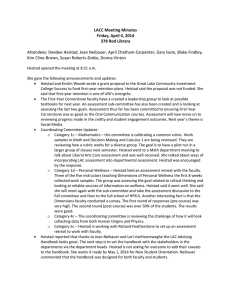Liberal Arts Core Review Steering Committee (LAC-RSC) Meeting Minutes October 11, 2010
advertisement
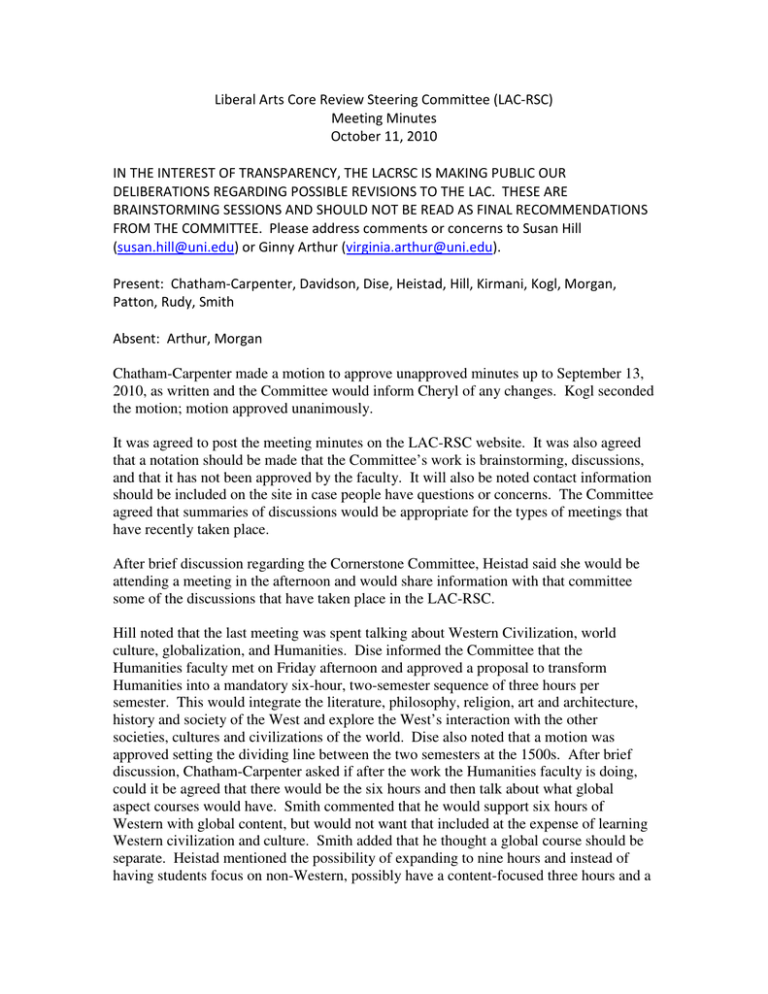
Liberal Arts Core Review Steering Committee (LAC-RSC) Meeting Minutes October 11, 2010 IN THE INTEREST OF TRANSPARENCY, THE LACRSC IS MAKING PUBLIC OUR DELIBERATIONS REGARDING POSSIBLE REVISIONS TO THE LAC. THESE ARE BRAINSTORMING SESSIONS AND SHOULD NOT BE READ AS FINAL RECOMMENDATIONS FROM THE COMMITTEE. Please address comments or concerns to Susan Hill (susan.hill@uni.edu) or Ginny Arthur (virginia.arthur@uni.edu). Present: Chatham-Carpenter, Davidson, Dise, Heistad, Hill, Kirmani, Kogl, Morgan, Patton, Rudy, Smith Absent: Arthur, Morgan Chatham-Carpenter made a motion to approve unapproved minutes up to September 13, 2010, as written and the Committee would inform Cheryl of any changes. Kogl seconded the motion; motion approved unanimously. It was agreed to post the meeting minutes on the LAC-RSC website. It was also agreed that a notation should be made that the Committee’s work is brainstorming, discussions, and that it has not been approved by the faculty. It will also be noted contact information should be included on the site in case people have questions or concerns. The Committee agreed that summaries of discussions would be appropriate for the types of meetings that have recently taken place. After brief discussion regarding the Cornerstone Committee, Heistad said she would be attending a meeting in the afternoon and would share information with that committee some of the discussions that have taken place in the LAC-RSC. Hill noted that the last meeting was spent talking about Western Civilization, world culture, globalization, and Humanities. Dise informed the Committee that the Humanities faculty met on Friday afternoon and approved a proposal to transform Humanities into a mandatory six-hour, two-semester sequence of three hours per semester. This would integrate the literature, philosophy, religion, art and architecture, history and society of the West and explore the West’s interaction with the other societies, cultures and civilizations of the world. Dise also noted that a motion was approved setting the dividing line between the two semesters at the 1500s. After brief discussion, Chatham-Carpenter asked if after the work the Humanities faculty is doing, could it be agreed that there would be the six hours and then talk about what global aspect courses would have. Smith commented that he would support six hours of Western with global content, but would not want that included at the expense of learning Western civilization and culture. Smith added that he thought a global course should be separate. Heistad mentioned the possibility of expanding to nine hours and instead of having students focus on non-Western, possibly have a content-focused three hours and a global humanities for six hours. Additional discussion took place regarding the strategic plan and getting more feedback from the faculty. Davidson asked if some essential outcomes have been identified, then maybe look past the traditional way of doing things to see if there are some true beliefs that there might be multiple places to target, such as a critical thinking course. She added that maybe one of expectations is that we’re going to assess, in new ways, performance of students to show their critical thinking and reflecting cultural diversity, the global view of the world or that they are a global citizen and what that means. She asked if there are other ways besides having another category that isolates those concepts that really are infused throughout. Patton said that if Western Civilization is being taught in an isolated way, the same product is being produced that has always been produced and he felt that it should go beyond that. Smith added that it would be great if globalization could be taught across the curriculum, but asked if the faculty, the LACC and others going to have the discipline to make sure that actually gets done. He also noted that the tendency is for faculty to get into the particular things they are most interested in and the cross-curricular issues get pushed aside. Patton asked if a program is being devised to what is thought to be best for students or a program devised toward what faculty want to teach. Kogl talked about a range of courses counting for either global or diversity that were to be upper-level classes. She said if the current LACC is willing to say it is not going to approve courses as counting for a category if people haven’t demonstrated through their syllabi what they are doing in their courses. Kogl said that the LACC agrees that it should be pushing for the outcomes that are agreed upon. Kogl added that she would hope that the new coordinator of the LACC would have the teeth to say what things are valuable and that they need to be diffused, especially the diversity component. Davidson added that not just the syllabi, but what the students learn and there must be the outcomes piece. Heistad asked if the non-west has to be ghettoized into its own category or has the day come when we actually have the expertise to look at the multiple perspectives. She added that it could be a celebration to get to the point where the de-ghettoize the nonwest history and include it in the framework of the foundations of our students who are going to be living in a world that is different from the one that we know. The Committee agreed that it was looking at nine hours on culture and that it would need additional information from faculty. Hill said that one of the questions would be whether or not the Committee would like to see a course on U.S. cultural diversity. Dise said that regardless of how global the 21st century is, our students are going to experience it as Americans and they need to know something about America. Hill summarized that according to responses from the Committee, there isn’t agreement among everyone that an American experience course is needed. Davidson asked if the lens is on what we want our students to be like or on faculty that teach the courses. Dise responded that you still need to have the resources to provide the education that is being designed. He added it is fine to create an ideal LAC, but you have to have the faculty resources to offer that LAC. He also noted that faculty is going to change over time as people retire and due to budget cuts. Davidson added that you can’t lose sight of the student as the heart of this and our obligation to prepare them for the world they’re in. Hill noted that people need to be encouraged to think outside the box a little bit and about how to balance the resources that we have with stretching ourselves and recognizing that things are going to change as time goes on. After additional discussion, the Committee agreed on three hours on U.S. diversity. Heistad noted that she would need to see the goals and outcomes. The next meeting will take place on Monday, October 18, 2010 in the College Eye Room, Maucker Union.
